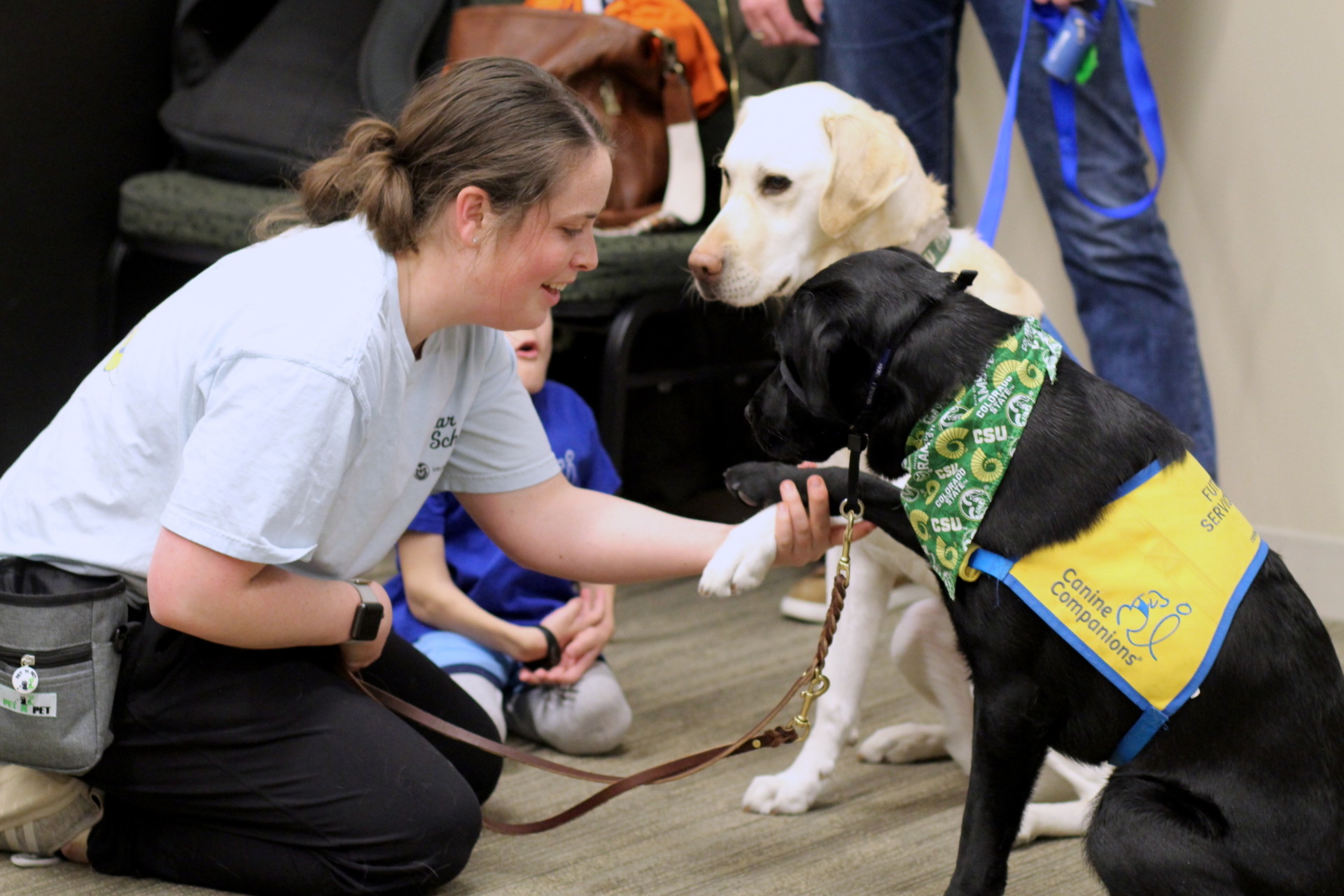'Paw-Sitive' Impact:
CSU Collar Scholars train puppies to become service dogs
story, photos and video by Haley Candelario
published Feb. 20, 2023
'Paw-Sitive' Impact:
CSU Collar Scholars train puppies to become service dogs story, photos and video by Haley Candelario published Feb. 14, 2023If you want to see the “paws-itive” impact CSU students have, look for the CSU Collar Scholars walking their dogs in bright yellow service vests.
The CSU Collar Scholars, a student-run organization that started in 2016, provides students with the opportunity to care for puppies who will eventually become service dogs. The collegiate chapter is part of the national nonprofit organization Canine Companions, which provides service dogs to people with disabilities free of charge.
“We really want to produce confident dogs that can adapt to any situation, and there’s nowhere better to do that than a college campus,” said Emily Arnow, the president of the CSU Collar Scholars and puppy raiser for her dog, Delta.
Members of the Collar Scholars consist of puppy raisers, puppy sitters and general members who all work closely with the puppies to help raise them for their future roles as service dogs.
“All of those people together… none of them could exist without the other,” Arnow said. “It just helps the puppies be really successful in their futures.”
Arnow, a second-year student studying neuroscience, said each role works together to provide the puppies with a variety of beneficial experiences. While puppy raisers like Arnow are the primary caretakers of the dogs, puppy sitters act as a support system when raisers are unable to care for their dogs.

CSU Collar Scholars President Emily Arnow smiles as dogs Velocity and Delta respond to her command to shake her hand. (Photo by Haley Candelario)
“For me, I have labs during the week, and (Delta) can’t come to those, so that’s when I call a puppy sitter to say, ‘Hey, do you want to come hang out with her while I’m in class?’” Arnow said. “It’s multi-beneficial – I’m getting a break from her, she’s spending time with someone else; she’s also learning to work with different handlers, which is really helpful for her future.”
General members can sit in on meetings every Tuesday at 6:30 p.m. to learn more about how to handle and work with service dogs.
“I think this community gives so much to these dogs, even just walking around campus (and) getting to share with people about it is super important.”
— Emily Arnow, president of the CSU Collar Scholars
One of those meetings featured Christine and Cooper Tippett and their Canine Companion Velocity. Velocity was raised at CSU by a previous member of the CSU Collar Scholars, then paired with the Tippetts after completing her training as a skilled companion.
Cooper, aged 10, has skeletal issues and was diagnosed with Morquio syndrome (Mucopolysaccharidosis Type IV) in 2014. People diagnosed with Morquio syndrome do not produce enough of a specific enzyme, which affects the body’s ability to get rid of cellular waste.
Cooper’s mom, Christine, said every week, Cooper undergoes enzyme replacement therapy, an all-day infusion process to replace the missing enzyme and slow the progression of Morquio syndrome. However, the therapy does not address his skeletal problems, so Cooper has undergone seven surgeries; Velocity has been Cooper’s companion for four of the surgeries. She helps keep him company as he heals from surgeries and is physically restricted.
“It gives Coop – I won’t say a new lease on life – but a new identity,” Christine said. “He’s not the kid with a disability, he’s the kid with a dog, and that’s awesome. She’s his buddy through thick and thin.”

Cooper Tippett pets his dog Velocity’s head. (Photo by Haley Candelario)
Puppies who are part of the CSU Collar Scholars come to a puppy raiser at 8 weeks old and stay until they are 18 months old, when they return to Canine Companions to complete their training. Once back with the national organization, the puppies go through temperament and health tests to determine which track of service dog they become; the tracks include service dogs, facility dogs, hearing dogs and dogs for veterans. Upon graduation, puppy raisers like Arnow can fly out to California and hand over their puppy’s leash to their new handler.
For Arnow, her dog Delta will return to Canine Companions in November 2023, which she said will be emotional, but she focuses on the bigger impact Delta will have.
“It’s hard to give her up, obviously, but knowing that she’s going on for this bigger purpose is super validating,” Arnow said. “There will be tears, but every amount of effort I’ve put into her is going to go on to the person she works with, so it’s super rewarding.”
Learn more
For more information about the CSU Collar Scholars, visit their website: collarscholarscsu.wixsite.com/home.
Along with the greater purpose Arnow knows her puppy will go on to have, she said the Collar Scholars is important for the education it provides to students both in and out of the organization.
“There’s a lot of misinformation about service dogs, but I also think we have this incredible opportunity on this campus which is unmatched anywhere else,” Arnow said. “I think this community gives so much to these dogs, even just walking around campus (and) getting to share with people about it is super important. I think it’s giving the community some educational purposes, but all the people involved know that if these dogs graduate, they’ve had some part in their journey. I think that’s super fulfilling.”